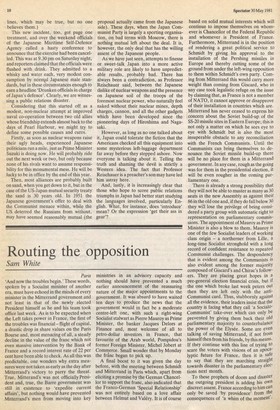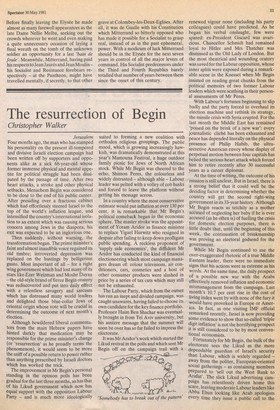Routing the opposition
Sam White
Pans 'And now the troubles begin.' These words, spoken by a Socialist minister of another era, must have echoed in the minds of every minister in the Mitterrand government and not least in that of the newly elected President himself as he and his team took office last week. As is to be expected when the Left takes power in France, the first of the troubles was financial — flight of capital, a drastic drop in share values on the Paris Bourse and, most menacing of all, a steady decline in the value of the franc which not even massive intervention by the Bank of France and a record interest rate of 22 per cent have been able to check. As all this was predictable, one wonders why extra measures were not taken as early as the day after Mitterrand's victory to parry the threat. True, Mitterand's was not officially President and, true, the Barre government was still in existence to 'expedite current affairs', but nothing would have prevented Mitterrand's men from moving into key ministries in an advisory capacity and nothing should have prevented a much earlier announcement of the reassuring nature of the major appointments to the government. It was absurd to have waited ten days to produce the news that the government would in fact be a moderate centre-left one, with such a right-wing Socialist stalwart as Pierre Mauroy as Prime Minister, the banker Jacques Delors at Finance and, most welcome of all to petro-dollar investors in France, that favourite of the Arab world, Pompidou's former Foreign Minister, Michel Jobert at Commerce. Small wonder that by Monday the franc began to pick up.
A final boost to it was given the day before, with the meeting between Schmidt and Mitterrand in Paris which, apart from eliciting a promise by the German Chancellor to support the franc, also indicated that the Franco-German 'Special Relationship' was not entirely based on a love affair between Helmut and Valery. It is of course based on solid mutual interests which will continue to impose themselves on whom ever is Chancellor of the Federal Republic and whomever is President of France. Furthermore, Mitterrand is in the position of rendering a great political service to Schmidt by giving his approval to the installation of the Pershing missiles in Europe and thereby cutting some of the ground from under the left-wing opposition to them within Schmidt's own party. Coming from Mitterrand this would carry more weight than coming from Giscard, who in any case took legalistic refuge on the issue by claiming that, as France is not a member of NATO, it cannot approve or disapprove of their installation in countries which are. Mitterrand has never ceased to express his concern about the Soviet build-up of the SS-20 missile sites in Eastern Europe; this is not only a matter on which he sees eye to eye with Schmidt but is also the most insuperable obstacle to any reconciliation with the French Communists. Until the Communists can bring themselves to denounce the Soviet missile build-up there will be no place for them in a Mitterrand government. In any case, rough as the going was for them in the presidential election, it will be even rougher in the coming parliamentary one.
There is already a strong possibility that they will not be able to muster as many as 30 seats in the new Assembly as against their 86 in the old one and, if they do fall below 30 they will lose the privilege of being considered a party group with automatic right to representation on parliamentary commissions. The appointment of Mauroy as Prime Minister is also a blow to them. Mauroy is one of the few Socialist leaders of working class origin — a northerner from Lille, a long-time Socialist stronghold with a long record of confident resistance to repeated Communist challenges. The despondency that is evident among the Communists is also evident among the former majority composed of Giscard's and Chirac's followers. They are placing great hopes in a pre-general election financial crisis, but if the one which broke last week peters out then they are left only with the antiCommunist card. Thus, stubbornly against all the evidence, their leaders insist that the country is facing what they call 'a SocialoCommunist' take-over which can only be prevented by giving them back their old parliamentary majority to counterbalance the power of the Elysee. Some are even talking of saving Mitterrand, if not from himself then from his friends, by this tneans. If they continue with this line of trying to scare the voters with visions of an apocalyptic future for France, then it is safe to say that they are marching straight towards disaster in the parliamentary elections next month.
To these prophets of doom and disaster the outgoing president is adding his own discreet assent. France according to him earl only be saved 'by providence' from the consequences of 'a whim of the moment Before finally leaving the Elys6e he made almost as many farewell appearances as the late Dame Nellie Melba, seeking out the crowds wherever he went and even making a quite unnecessary occasion of laying a final wreath on the tomb of the unknown soldier an opportunity for a last 'bain de Pule'. Meanwhile, Mitterrand, having paid his respects to Jean Jaures and Jean Moulin — his Socialist and Resistance forebears respectively — at the Pantheon, might have travelled mentally, if secretly, to that other grave at Colombey-les-Deux-Eglises. After all, it was de Gaulle with his Constitution which Mitterrand so bitterly opposed who has made it possible for a Socialist to grasp real, instead of as in the past ephemeral, power. With a modicum of luck Mitterrand should be in the Elysee for the next seven years in control of all the major levers of command. His Socialist predecessors under the Third and Fourth Republics barely totalled that number of years between them since the onset of this century.











































 Previous page
Previous page